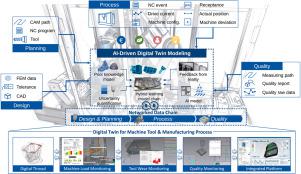Robotics and Computer-Integrated Manufacturing ( IF 10.4 ) Pub Date : 2023-02-20 , DOI: 10.1016/j.rcim.2023.102545 Ziqi Huang , Marcel Fey , Chao Liu , Ege Beysel , Xun Xu , Christian Brecher

|
Digital twin (DT) and artificial intelligence (AI) technologies are powerful enablers for Industry 4.0 toward sustainable resilient manufacturing. Digital twins of machine tools and machining processes combine advanced digital techniques and production domain knowledge, facilitate the enhancement of agility, traceability, and resilience of production systems, and help machine tool builders achieve a paradigm shift from one-time products provision to on-going service delivery. However, the adaptability and accuracy of digital twins at the shopfloor level are restricted by heterogeneous data sources, modeling precision as well as uncertainties from dynamical industrial environments. This article proposes a novel modeling framework to address these inadequacies by in-depth integrating AI techniques and machine tool expertise using aggregated data along the product development process. A data processing procedure is constructed to contextualize metadata sources from the design, planning, manufacturing, and quality stages and link them into a digital thread. On this consistent data basis, a modeling pipeline is presented to incorporate production and machine tool prior knowledge into AI development pipeline, while considering the multi-fidelity nature of data sources in dynamic industrial circumstances. In terms of implementation, we first introduce our existing work for building digital twins of machine tool and manufacturing process. Within this infrastructure, we developed a hybrid learning-based digital twin for manufacturing process following proposed modeling framework and tested it in an external industrial project exemplarily for real-time workpiece quality monitoring. The result indicates that the proposed hybrid learning-based digital twin enables learning uncertainties of the interaction of machine tools and machining processes in real industrial environments, thus allows estimating and enhancing the modeling reliability, depending on the data quality and accessibility. Prospectively, it also contributes to the reparametrization of model parameters and to the adaptive process control.
中文翻译:

基于混合学习的制造过程数字双胞胎:建模框架和实现
数字孪生 (DT) 和人工智能 (AI) 技术是工业 4.0 迈向可持续弹性制造的强大推动力。机床和加工过程的数字孪生结合了先进的数字技术和生产领域知识,有助于提高生产系统的敏捷性、可追溯性和弹性,并帮助机床制造商实现从一次性产品供应到持续供应的范式转变服务交付。然而,车间级数字孪生的适应性和准确性受到异构数据源、建模精度以及动态工业环境不确定性的限制。本文提出了一种新颖的建模框架,通过在产品开发过程中使用聚合数据深入集成 AI 技术和机床专业知识来解决这些不足之处。构建数据处理程序以将来自设计、规划、制造和质量阶段的元数据源上下文化,并将它们链接到数字线程中。在此一致的数据基础上,提出了一个建模管道,将生产和机床先验知识纳入 AI 开发管道,同时考虑动态工业环境中数据源的多保真性。在实施方面,我们首先介绍了我们在构建机床和制造过程的数字孪生方面的现有工作。在这个基础设施中,我们按照建议的建模框架为制造过程开发了一个基于混合学习的数字双胞胎,并在外部工业项目中对其进行了示例性的测试,以实时监控工件质量。结果表明,所提出的基于混合学习的数字双胞胎能够学习真实工业环境中机床和加工过程相互作用的不确定性,从而可以根据数据质量和可访问性来估计和增强建模可靠性。展望未来,它还有助于模型参数的重新参数化和自适应过程控制。结果表明,所提出的基于混合学习的数字双胞胎能够学习真实工业环境中机床和加工过程相互作用的不确定性,从而可以根据数据质量和可访问性来估计和增强建模可靠性。展望未来,它还有助于模型参数的重新参数化和自适应过程控制。结果表明,所提出的基于混合学习的数字双胞胎能够学习真实工业环境中机床和加工过程相互作用的不确定性,从而可以根据数据质量和可访问性来估计和增强建模可靠性。展望未来,它还有助于模型参数的重新参数化和自适应过程控制。



























 京公网安备 11010802027423号
京公网安备 11010802027423号